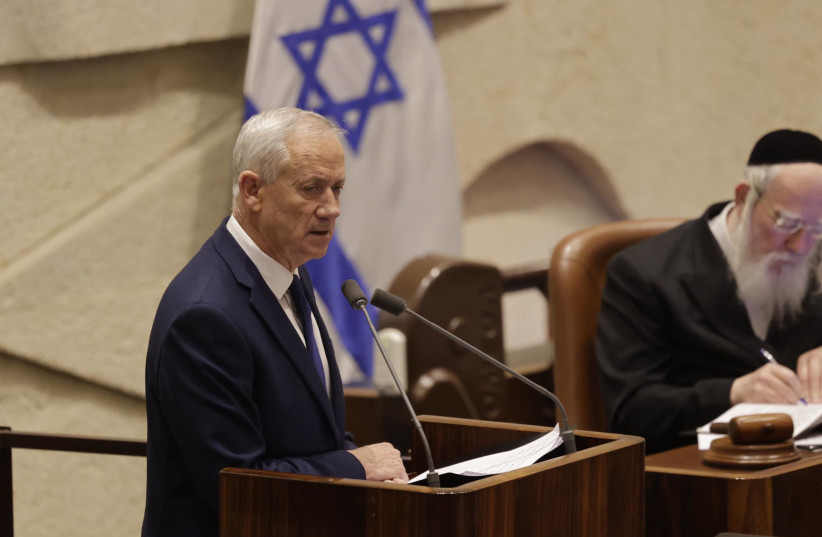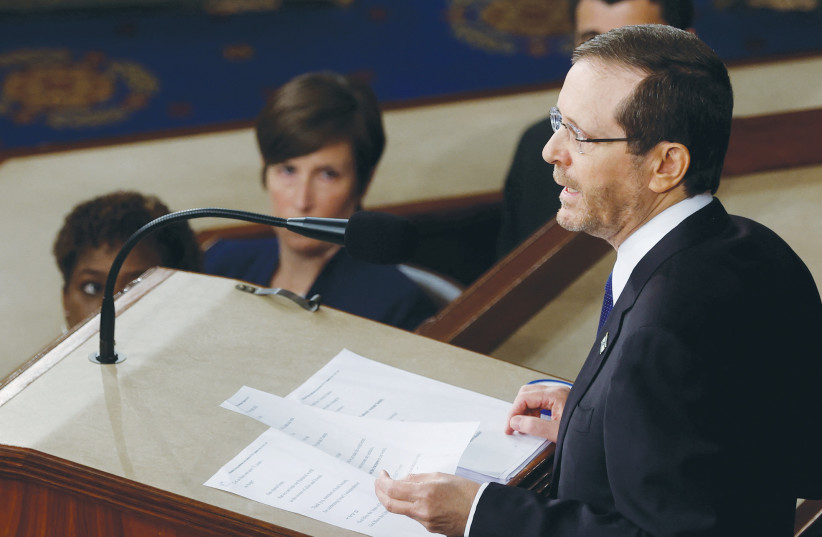The Knesset passed the bill to cancel the reasonableness standard into law on Monday. It marked the first part of the government’s contentious judicial reform to pass into law after six months of fierce public debate and negotiations on a possible compromise that continued until the last minute.
The opposition boycotted the vote, and the final tally was 64-0. Every member of the coalition voted in favor of the bill.
“We are now heading to a long recess,” Justice Minister Yariv Levin (Likud) said in the Knesset plenum after the bill passed. “I am setting out, knowing that we passed an important bill, but with no gloating and with a true wish to bring all parts of the nation together.”
Finance Minister Bezalel Smotrich (Religious Zionist Party) said: “After hard work and effort over many years, we are beginning to fix the justice system and returning the balances between the branches of government that were violated 30 years ago by [former High Court president] Aharon Barak.”
National Security Minister Itamar Ben-Gvir (Otzma Yehudit) said the bill’s passage was “just the beginning” and that the rest of the reform should pass “for a more Jewish and more democratic State of Israel.”

Changing how the Judicial Selection Committee is chosen and amending the attorney-general’s powers would be the next steps, he said.
Opposition leader Yair Lapid (Yesh Atid) said the bill’s passage was the beginning of the government’s “canceling the checks and balances, canceling the separation of powers, canceling the gatekeepers, canceling Israeli democracy’s entire immune system.”
“This is not a victory for the coalition; it is a defeat for Israeli democracy,” he said.
Yesh Atid to appeal to High Court
Lapid said Yesh Atid would appeal to the High Court of Justice against the bill on Tuesday morning.
He also called on IDF reservists who had threatened to cease volunteering for reserve duty to hold off from doing so until after the High Court ruled on it.
With the bill’s passage into law, the High Court may no longer strike down administrative decisions that are deemed “extremely unreasonable,” beyond the scope of what a responsible and reasonable authority would undertake.
The standard may no longer be applied to decisions made by the prime minister, the cabinet as a whole, or any specific minister. It also bars its use against a minister’s decision not to use his or her authority, and on ministers’ appointments of government workers.
Law mean Deri may return to ministerial role
The law may have immediate effects. Shas chairman Arye Deri was removed from his position as health minister and interior minister in January based on the reasonableness standard, as the High Court ruled that his appointment despite three previous white-collar convictions was “beyond the realm of reasonableness.”
The government may now attempt to reappoint Deri. However, Deri’s appointment was struck down for other legal reasons as well, and it was not clear whether his reappointment would pass another challenge in the High Court.
Another outcome of the law is that the High Court cannot use the reasonableness standard to force Levin to convene the Judicial Selection Committee. Levin hopes to alter the makeup of the committee to give the government power over appointing justices, and he is likely to refrain from convening the committee under its current makeup.
The voting on the bill’s second and third readings included 140 objections and lasted for more than three hours. This came after a marathon 26-hour debate that began on Sunday at 10 a.m. and ended at noon on Monday.
Drama continued until the last minute as negotiations over a compromise continued among ministers in the plenum throughout the vote, with President Isaac Herzog reportedly speaking on the phone at one point with Deri and representatives of the President’s Residence speaking on the phone to Netanyahu. No compromise proposals bore fruit, however, and the bill passed.
Levin and Constitution, Law, and Justice Committee chairman Simcha Rothman (RZP) in their closing remarks prior to the vote accused the opposition of blowing out of proportion the ramifications of the bill and said it would not harm individual rights.
Rothman said no one believed “the lie” that the protests were actually about the reasonableness standard.
“For too long, we have become accustomed to the important discussions happening not in this house [the Knesset],” he said, adding that the talks at the President’s Residence were a “continuation of the same major problem that the Knesset has ceased being the house that clarifies the important issues in our lives.”
Lapid said the government was creating a deep rift in the country and intentionally allowing it to fall apart.
“I sat down the past day with the heads of the security system, with the head of the Shin Bet [Israel Security Agency], with representatives of the IDF,” he said. “We are headed for disaster.”
“If you vote today on this bill, you are hastening the end of the People’s Army, you are strengthening Israel’s enemies, [and] you are causing real harm to the security of the country,” he added.
Lapid accused the Likud MKs of knowing “that this is a takeover by an extreme minority over the Israeli majority and also a hostile takeover of your party. You know that what is happening here is a disaster that can be prevented – a tragedy that we must stop.”

National Unity chairman Benny Gantz said a majority of MKs did not support passing the reasonableness standard bill without reaching a compromise. Coalition MKs who opposed the legislation were being held hostage by extremist elements who were not interested in compromise, he said. Passing the bill would harm cohesion in the IDF and damage Israel’s national security, he added.
Earlier on Monday, Herzog said in a statement: “We are in a state of national emergency. This is the moment for responsibility.
“We are working around the clock, in every possible way, to find a solution. The infrastructure for a possible understanding exists, yet gaps remain that require the various parties to show responsibility.
“The citizens of Israel are thirsting for hope and expect responsibility and leadership. During these decisive hours, I call on elected officials to act with courage and to reach out to arrive at an understanding,” Herzog said.
